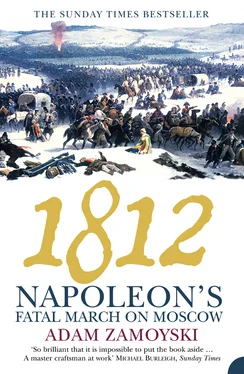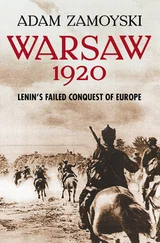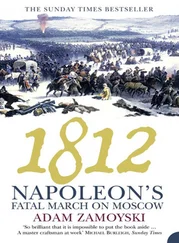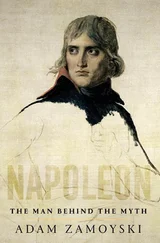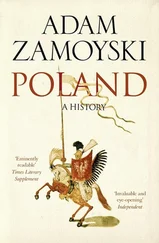France’s position on the Continent was by then one of unprecedented power; her political culture and the new system were imposed over vast areas of Europe. But to the average Frenchman this was of less interest than the benefits the past decade had brought him at home. All the most positive gains of the revolution had been salvaged, but order, prosperity and stability had been guaranteed, and a general amnesia if not amnesty had allowed those divided by the struggles of the revolution to put the more unpleasant aspects of the past behind them. Whether this new order would survive depended not only on Napoleon’s ability to defend it, but on his ability to guarantee its continuance by cancelling out the possibility of a Bourbon restoration. A return of the Bourbons would mean not only a return to the ancien régime ; it would also raise the prospect of much score-settling.
In this respect, the birth of the King of Rome was crucial. Most of Napoleon’s subjects believed that their ruler, who had recently turned forty, would henceforth be inclined to spend more time with his family than with his armies, that Napoleon the Great would in time be succeeded by Napoleon II, and that the rest of Europe would accept that the Bourbons had been consigned to history. That was why they rejoiced. ‘People sincerely anticipated a period of profound peace; the idea of war and occupations of that sort were no longer entertained as being realistic,’ wrote Napoleon’s chief of police, General Savary, adding that the child appeared to all as the guarantor of political stability. 10
Napoleon himself rejoiced for much the same reasons. ‘Now begins the finest epoch of my reign,’ he exclaimed. He had always been keenly aware that a man who seizes the throne can never rest easy on it, and that he could only achieve security of tenure by means of the dynastic principle. ‘With the birth of my son, there is a future in my destiny,’ he told one of his diplomatic agents. ‘I am now founding a legitimacy. Empires are created by the sword and are conserved by heredity.’ 11
But he was not yet ready to lay down his arms. He had managed to destroy the unity of purpose which had fed the coalitions against France for so long. Austria, Russia and Prussia were now as ready to fight each other as to fight France, the original repugnance to treat with ‘the Corsican upstart’ had largely evaporated, his imperial title was recognised across the Continent, and the Bourbon pretender Louis XVIII was beginning to look like an anachronism. Yet Napoleon was keenly aware of his continuing vulnerability, for nothing had been finally settled.
Over the past decade he had turned France into an empire which included the whole of Belgium, Holland and the North Sea coast up to Hamburg, the Rhineland, the whole of Switzerland, Piedmont, Liguria, Tuscany, the Papal States, Illyria and Catalonia, and ruled directly over some forty-five million people. The French Empire was surrounded by a number of dependent states – the Kingdom of Westphalia, the kingdoms of Saxony, Bavaria, Württemberg and other states grouped in the Confederation of the Rhine, the Grand Duchy of Warsaw, the kingdoms of Italy, Naples and Spain, ruled by Napoleon’s siblings, relatives or devoted allies. The only part of his vast imperium where there was open unrest was in Spain, where armed opposition to his brother King Joseph was being supported by a British army. This was not in itself a major problem, and could be dealt with by a concerted operation under his own direction.
The real problem facing Napoleon was how to achieve some kind of finality and to fit all his conquests into a system that would guarantee his and his successors’ position. While others regarded him as a megalomaniac bent on conquering all, he saw his wars as defensive, aimed at guaranteeing France’s security as well as his own. ‘To leave my throne to my heirs,’ he told one of his chamberlains, ‘I will have had to be master of all the capitals of Europe!’ In the written instructions to one of his diplomatic envoys, he explained that although France
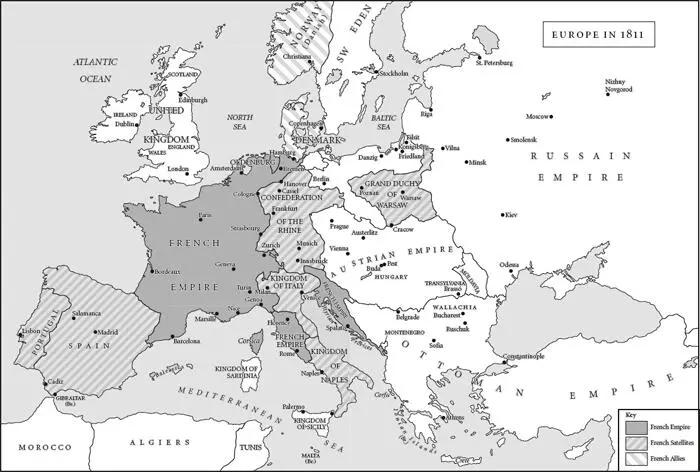
was at the height of her power, ‘if she cannot fix the political constitution of Europe now, she may tomorrow lose all the advantages of her position and fail in her enterprises’. 12
But a final settlement that would secure his gains for the future eluded him, partly because he kept expanding its scope, meaning it to be comprehensive, and partly because war was his element; he could not see his way to achieving his ends by other means. That was why all his treaties to date were no more than truces, and all his arrangements remained fluid pending the elusive ultimate peace settlement. The Empire was a work in progress.
At the time of the birth of his son, Napoleon was forty-two years old. He was five feet two inches tall, which was small even at the time, but he had a well-proportioned figure. ‘His complexion had never had much colour; his cheeks were of a matt white, giving him a full, pale face, but not of the kind of pallor that denotes a sick person,’ wrote his secretary Baron Fain. ‘His brown hair was cut short all over and lay flat over his head. His head was round, his forehead was large and high; his eyes were grey-blue, with a gentle look in them. He had a handsome nose, a graceful mouth and beautiful teeth.’ But he had recently begun to put on weight. His body filled out, his neck, which was short anyway, thickened, and he developed a paunch. Those close to him noted that his eyes grew less piercing. He spoke more slowly and took longer to make decisions. His phenomenal powers of concentration diminished, and those used to his fits of fury were surprised to find him growing more pensive and hesitant. Something was eating away at the vital force of this Promethean creature. It has been convincingly suggested that his pituitary gland failed as he reached the age of forty, causing dystrophia adiposogenitalis, a condition that leads to weight gain and loss of energy. 13
It is impossible to say whether Napoleon himself was aware of any decline. His enemies had certainly noted that his victories were no longer as resounding as they had been, and he must have realised this as well. Even if this was not quite the twilight of his life, the end of his active career could not be that far off, so the final battles would have to be fought soon and a permanent settlement put in place in the near future.
The principal obstacle to such a settlement was Britain, with which France had become locked in a self-perpetuating duel. With her control of the seas, Britain could cripple French trade and support resistance anywhere on the European mainland, as she was currently doing in Spain. After the annihilation of his fleet at Trafalgar in 1805 Napoleon could not hope to confront the British navy in battle. He had therefore decided to ruin her economically, by closing the whole Continent to her trade.
The idea was not new. It was one of the fundamental French beliefs that Britain’s wealth came not from herself but from her colonies, which supplied commodities she could sell on to Europe at vast profit. Every conflict between Britain and France over the past century had included a tariff war, and the revolutionary government and the Directory inherited this tradition. As there was widespread commercial jealousy of Britain, this was a popular policy. Napoleon carried on this tradition, setting ever higher tariffs and eventually banning all British trade from the Continent.
In theory, the French policy was bound to bring about economic hardship in Britain that would undermine support for her war effort. The Whigs, currently in opposition, had sympathised with the revolution in France and opposed the waging of war against her, and many admired Napoleon himself. Although they were in a minority, their calls for peace with France might well have carried the day if British trade had really begun to suffer. But in the long run, France probably suffered more than Britain. And Napoleon’s Continental System, as he called it, was in effect unenforceable. Smuggling and corruption holed it even in French ports, while some of France’s dependent states and allies were hardly enforcing it at all.
Читать дальше
